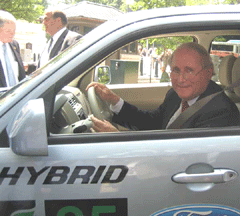Oil Price Soars, Energy Bill Stalls
Air Date: Week of November 9, 2007

Senator Carl Levin (D-MI) tests out a Hybrid. (Courtesy of U.S. House of Representatives)
When Democrats won Congress a year ago they pledged to boost alternative fuels and auto efficiency. But even with oil approaching $100 a barrel the energy bill is still stuck in legislative limbo. Living on Earth's Washington correspondent Jeff Young tells us why.
Transcript
GELLERMAN: It’s Living on Earth. I’m Bruce Gellerman. The price of crude oil is rapidly approaching a landmark 100 bucks a barrel, and at the pump—well, we don’t need to rub it in. Meanwhile the U.S. has the lowest automobile fuel economy standards in the world. And here’s something else to consider. Three quarters of people polled say when it comes to energy; they don’t like the job Congress is doing.
Democrats won control of Capitol Hill a year ago promising action on auto efficiency standards and alternative fuels. But as Living on Earth’s Jeff Young tells it – while the price of fuel is accelerating, the Democrats energy bill has stalled.
[SOUND OF CARS DRIVING AND GAS PUMPING]
TAYLOR: Okay, so it cost me $44 and 84 cents to fill up my tank. Usually $40 would have done it, but not today, not today.
YOUNG: Penelope Taylor has watched gas prices in Silver Spring, Maryland, jump about 29 cents just since early October. She wonders why Congress isn’t jumping on the issue.
TAYLOR: Yeah, I think they should be doing a lot more, and I think they should be looking at fuel alternatives. There are all kinds of things that could be done that would make more efficient vehicles or make more efficient sources of heat for peoples’ homes, all kinds of things, yeah.
YOUNG: Taylor’s talking about just the things Democratic leaders like House Speaker Nancy Pelosi talked about when they won control of Congress.
PELOSI: I have asked the chairs of the relevant committees to pass legislation so that by the Fourth of July we can have a package of legislation to truly declare our energy independence.

Speaker Pelosi receives the Excellence in Leadership Award from MALDEF. (Courtesy of Office of the Speaker)
The Senate’s version included a historic increase in auto fuel efficiency, something the House could not agree to. The House version calls for renewable electricity like wind and solar. And House Resources Chair, Nick Rahall of West Virginia, insisted on repealing tax breaks for the oil and gas industry. Rahall says those breaks were meant to encourage more drilling and refining when oil prices were low.
RAHALL: I think with prices what they are today, I hardly think now is the time that they need more incentives, and more grants, and more royalty holidays to go out there and drill.
YOUNG: Repealing tax breaks for the oil industry seemed to fit the public mood. And polls show the public strongly supports fuel efficiency and conservation measures. But as summer turned to fall the effort to meld the Senate and house bills into one remained stuck in legislative limbo.
Now, we all remember from civics class how this is supposed to work, right? When the two bodies of congress pass different versions of a bill a special committee meets to resolve the differences. But what you probably did not learn in school is that the committee can be blocked.
HUTCHISON: I am very concerned about the taxes in the bill and that’s why I’m holding it up because it is terrible tax policy.
YOUNG: That’s Texas Republican Senator Kay Bailey Hutchison. She leads a handful of senators from oil-producing regions upset that the House bill takes away tax breaks for the industry.
HUTCHISON: Just two years ago we passed an incentive for refiners. So we say, of course, that we have a shortage and increasing refinery capacity is a worthy goal. We give incentives now two years later we’re going to take them away? I can’t let a bill go without assurances that those tax increases that target production of gasoline will be eliminated.
YOUNG: Hutchison is backed up by President Bush, who has threatened a veto. Massachusetts Democratic congressman Ed Markey says that’s the big hurdle to getting a final energy bill.
MARKEY: So that’s clearly at the heart of this debate, is the president still standing by the oil companies and threatening to veto the energy bill over tax breaks for the oil industry.
YOUNG: But Democrats have other problems within their own ranks. The Senate version of the bill would raise auto fuel efficiency standards to 35 miles per gallon by the year 2020. That’s too much for some powerful Democrats from auto-making areas like Indiana and especially, Michigan.

Senator Carl Levin (D-MI) tests out a Hybrid.
(Courtesy of U.S. House of Representatives)
YOUNG: That’s Michigan Democratic Senator Carl Levin, who’s still pushing for lower mileage targets and more time for the industry to meet them. That failed in the Senate, but he’s hopeful he might still work it into the final bill even if it means delaying the bill’s completion.
LEVIN: I think it’s worth getting a fair conclusion. We’ve got to make progress on the energy bill but we’ve also got to have a standard which is practical, and not just for the Big Three but folks like Toyota.
YOUNG: The combined opposition from oil patch Republicans and Motor City Democrats makes passage of a final energy bill very tough, unless Democratic leaders are willing to sacrifice some of the bill’s most meaningful parts. Other energy bills, however, are most assuredly coming—the ones consumers will pay for higher gas and home heating oil. For Living on Earth, I’m Jeff Young in Washington.
Links
Speaker Pelosi touts Democratic energy bill
Senator Kay Bailey Hutchison (R-TX) on energy
Green Car Congress overview of Senate's action on auto fuel efficiency
Living on Earth wants to hear from you!
Living on Earth
62 Calef Highway, Suite 212
Lee, NH 03861
Telephone: 617-287-4121
E-mail: comments@loe.org
Newsletter [Click here]
Donate to Living on Earth!
Living on Earth is an independent media program and relies entirely on contributions from listeners and institutions supporting public service. Please donate now to preserve an independent environmental voice.
NewsletterLiving on Earth offers a weekly delivery of the show's rundown to your mailbox. Sign up for our newsletter today!
 Sailors For The Sea: Be the change you want to sea.
Sailors For The Sea: Be the change you want to sea.
 The Grantham Foundation for the Protection of the Environment: Committed to protecting and improving the health of the global environment.
The Grantham Foundation for the Protection of the Environment: Committed to protecting and improving the health of the global environment.
 Contribute to Living on Earth and receive, as our gift to you, an archival print of one of Mark Seth Lender's extraordinary wildlife photographs. Follow the link to see Mark's current collection of photographs.
Contribute to Living on Earth and receive, as our gift to you, an archival print of one of Mark Seth Lender's extraordinary wildlife photographs. Follow the link to see Mark's current collection of photographs.
 Buy a signed copy of Mark Seth Lender's book Smeagull the Seagull & support Living on Earth
Buy a signed copy of Mark Seth Lender's book Smeagull the Seagull & support Living on Earth

